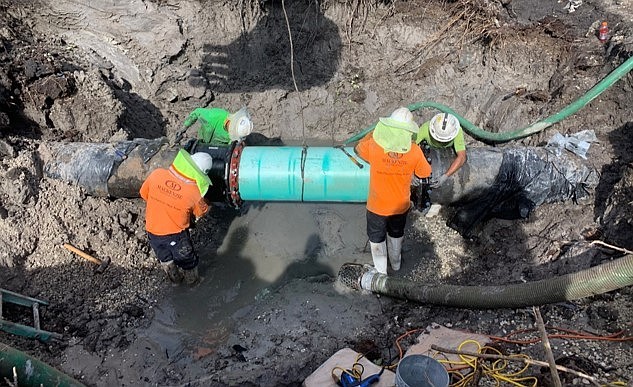- April 4, 2025
-
-
Loading

While Longboat Key commissioners await a potential state penalty after June’s sewage line break in Manatee County, town staff is examining the possibility of advancing its redundant pipe project with three options.
Longboat Key Public Works Director Isaac Brownman is estimating for the overall project to cost about $16 million, but he said he still needs more information from the regulatory agencies.
The town has retained Carollo Engineers, Inc. to help in submitting permit documents this month to the Florida Department of Environmental Protection and the U.S. Army Corps of Engineers.
“They look for what types of environmental impacts may be associated with the construction and installation,” Brownman said. “Are there going to be any environmental mitigation requirements related to installation?”
Specifically, Brownman said the Corps of Engineers will ask the town and its engineers for alternative analyses to evaluate the current pipe route and possibly other pipe routes for consideration. The town does not have an estimation yet on how long the entire project could take.
Last week, Brownman provided an update on the project to town commissioners. He presented three initial options for work on the mainland side of the sewage route. This portion of the project would cost between $860,000 and $2.51 million.
The dry line portion means if the regulatory agencies approve the town’s permits, a line would be installed on the mainland but with no fluids moving through it until the town continued the entire project under Sarasota Bay.
“What I was advising the commission is we don’t want to start any kind of dry line project until the Army Corps validates our route because if we start installing, let’s say these lines on the landward side and the Army Corps says, ‘We don’t like that route. We’re only going to permit a different route,’ then those improvements would essentially be thrown away,” Brownman said.
Upon receiving permitting, town commissioners would need to approve one of the dry line options before moving forward. Ultimately, it depends on how much money is available considering the project is currently unfunded.
“If we were going to do any of the options, I think they all have their benefits,” Brownman said. “Even if we could just do option one, that would still be better than having to come back later, especially because that area of Long Bar [Point] is under active development. It's preferred to do something sooner rather than later to avoid having to navigate within an existing development.”
Brownman wrote in a town document to Town Manager Tom Harmer that the timeframe to design, permit and install a dry line is about 21 months.
However, Brownman said the 21-month timetable could be impacted if the town is told to follow a different pipe route. Brownman also mentioned regulations about how the town would need to mitigate seagrasses as part of the project to build a new cross-bay pipeline. Generally, projects that disturb seagrass beds are required to mitigate that disturbance at least acre for acre.
The town is planning to advance the final design and construction of the full project to fiscal years 2024 and 2025.
“My personal opinion is that we ought to make every effort to replace that unsure line as quickly as possible, and if possible, rely on the old line as a backup so we have redundancy,” District 2 Commissioner George Spoll said during a recent commission meeting discussion of the issue.
The town will also pursue opportunities for outside funding to help pay for the redundant pipe project to avoid placing the entire cost on sewage system users, Brownman said.
The FDEP is still in the process of evaluating its enforcement actions against the town after a sewage break from June 17-30 spilled about 11 million gallons, according to a preliminary report conducted by independent contractor Berkeley Research Group.
BRG’s report is subject to internal and external review before it is considered finalized. The town has also hired BRG to report on the cause of the leak, according to Harmer.
“We did ask them to prioritize the quantity of the leak,” Harmer said. “We wanted that first for FDEP purposes.”
Whenever the FDEP’s penalty is levied, town commissioners are expected to hold a private meeting with its legal counsel and determine the best course of action.
June’s sewage break has cost the town $242,454.75, including more than $76,000 for the initial repair to put the pipeline back in service and stop the leak.
On June 29, town officials reported to state regulators about the untreated sewage that spilled from the 22-square-inch break. The pipe was built in 1973, inspected in 2015-16 and given years of estimated life remaining.
The pipe is the only one leading from the island to a Manatee County treatment plant. After collecting sewage from the town's system, smaller pipes converge at a pumping station on Gulf Bay Road. From there, the town's untreated sewage flows through a 20-inch diameter iron pipe under the bed of Sarasota Bay. It terminates at a treatment facility north of Conquistador Parkway in Bradenton.
In the days between initial instrumentation discrepancies between the Longboat and Manatee County ends of the pipeline on June 18, workers tried to trace what was happening, ultimately finding evidence of the break about 100 yards from the shore of Sarasota Bay on the mainland on June 29.
Water-sample testing conducted throughout the month of July by Environmental Science Associates found the sewage break's effects on Sarasota Bay were low.